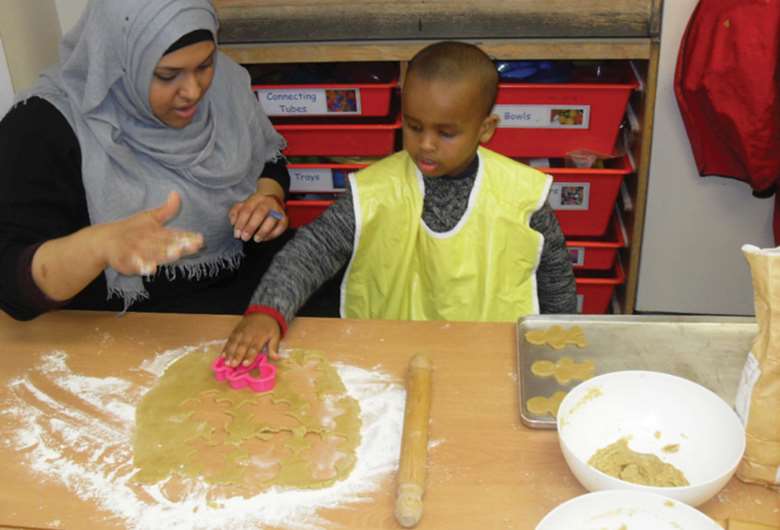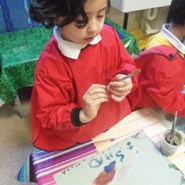Early Years Pupil Premium: Can nurseries make the EYPP work?
Charlotte Goddard
Monday, February 9, 2015
The early years pupil premium comes into effect this April. But while the extra funding is welcome, the initiative looks likely to present some challenges for settings, as Charlotte Goddard explains.

From April this year, disadvantaged three- and four-year-olds in early years settings in England will benefit from extra funding in the form of the early years pupil premium (EYPP). The funding builds on the pupil premium, introduced in schools in 2011, and early signs point to its effectiveness in tackling disadvantage. The EYPP funding - 53p an hour, to a maximum of £302.10 a year - has now been allocated in seven local authority pilots, launched this month. However, nurseries are already concerned that identifying children eligible for funding will be more challenging than it might be for schools.
In general, children who would be eligible for free school meals later on are eligible for the EYPP at age three and four, as well as looked-after children and those whose parents are in the armed forces. But while schools can point to a specific benefit - free food - to incentivise parents to register their children, nurseries have to communicate the less immediately obvious benefits of the EYPP money by itself.
Primary schools already have some experience of this, as when universal free school meals were introduced for infants last September there was no longer a direct way of checking eligibility for the pupil premium for children in the first three years of school.
LESSONS FROM SCHOOLS
Nurseries can use the EYPP as they wish in order to make a difference to the most disadvantaged. The money does not have to go directly to the child; it can be pooled and used for universal interventions. 'Unlike the old free school meals, there is no financial benefit to the family with EYPP, so what's in it for them?' says John Trow-Smith, information and systems manager at the London Early Years Foundation, which runs more than 30 nurseries across the capital.
'Anecdotally, schools' pupil premium numbers coming forward dropped very dramatically when universal infant free school meals started.'
The National Association of Head Teachers' policy adviser Valentine Mulholland agrees. 'The Government has told us figures from the October school census show a drop in pupil premium numbers - slight overall, but in some local authority areas it is significant,' she says. 'Some of our members say they have seen a fall of 50 per cent in pupil premium numbers in Reception classes.'
MISSING OUT
Even with the free food incentive, not every parent registers their child - 2013 figures found 38 per cent of eligible children in Bracknell Forest, for example, were not claiming pupil premium. Across the country as a whole, schools are missing out on more than £145m in funding. The concern is that nurseries will also lose out.
'National Insurance numbers or National Asylum Support Service numbers will be needed to register for the funding, and parents may not want to share this information or might be very slow to bring it to the provider,' says Mr Trow-Smith.
There are also questions about stigma: funding eligibility depends on details such as income, partners' income, the status of a relationship - sensitive information.
HOW IT WORKS
The National Day Nurseries Association's (NDNA) most recent survey found nurseries are mixed in terms of how much they are aware of the EYPP. 'Some nurseries have a clear idea of how they might use it while others are not really aware of what it is, or what the rules might be,' explains policy director Claire Schofield. 'There is definitely a communications job to be done.'
When the funding becomes available in April, nurseries will put forward the names of children they think will be eligible. The local authorities' virtual headteachers, responsible for data on looked-after children, will share details of the children who are eligible for the funding.
With schools in some areas, such as Tower Hamlets (see box), the local authority will share information about specific children whose families are receiving benefits and who are, therefore, eligible for funding. But not all areas provide that service, and even those that do may find it difficult to extend the service to nurseries, given the diversity of provision and information-sharing rules.
Local authorities will then check the eligibility of the names put forward and release the funding on a termly basis, at the same time as the free entitlement funding. Upcoming changes to the Small Business, Enterprise and Employment Bill are intended to enable local authorities to extend the eligibility checking service used for free school meals to EYPP. However, the bill is still at Committee Stage at present.
ADMIN COSTS
There are concerns too about high admin costs, both for nurseries and local authorities. 'The costs of running the scheme might have to come out of the dedicated schools grant, or eligibility checking could become a chargeable service,' says Mr Trow-Smith. 'So, while local authorities will have to pass the whole of the EYPP funding to providers, there may be a knock-on effect reducing funding elsewhere.'
Meanwhile, nurseries fear that the time they will have to spend on admin will draw personnel away from frontline work. 'Providers are concerned about how they will manage to draw down this money without it being a huge administration burden to prove entitlement, with a lot of back and forwarding to local authorities,' says the NDNA's Claire Schofield.
Mr Trow-Smith also questions whether local authorities are set up to handle a sudden influx of claims from nurseries. 'I don't think any changes have been made to the local authorities' IT systems to manage claims,' he says. 'This is likely to mean painful interim processes for providers to submit claims on paper or learning how to encrypt claims sent by email. Collecting, sending and storing additional sensitive data may be challenging for some providers.'
Pre-school Learning Alliance children's services director Anne Vine believes online checks have their problems too: 'Different local authorities take different approaches to checking eligibility for the EYPP - some use an online eligibility checker, others may only require parents to complete a paper form. In those areas where online checkers are used, parents' lack of IT skills, or lack of computer access, can be a significant barrier to registration.'
PERSUADING PARENTS
Most nurseries have not yet begun to communicate the importance of the extra money to parents, but clearly a strong relationship between nursery and parents will be helpful. Frontline staff will have the job of persuading families that sharing personal circumstances and data will help their child's learning.
'Providers will want to highlight the entitlement to all parents and particularly the parents whose children are more likely to be entitled,' says Ms Schofield. 'If a child is on a free two-year-old place already, then they are likely to be eligible for EYPP, for example.'
Ms Vine suggests that nurseries could offer use of computers to parents who do not have one to help them check eligibility online. Some nurseries may take a lead from schools that have even offered extra take-home learning resources or free items such as pencil cases to ensure full sign-up, but given the limited budget per child, this could be challenging.
TOO LITTLE
While the extra money is welcome, nurseries are questioning whether the amount will allow them to make real changes. 'The money is unlikely to make a significant difference for small providers; only large providers will be able to pool EYPP to make substantive interventions,' says Mr Trow-Smith.
Ofsted will be including measures on how nurseries are making a difference with the EYPP funding in its inspections, but there is some confusion as to how the inspectorate will ensure that this is consistent with the Department for Education's decision to allow providers to spend the premium as they wish.
'There is clearly a need for Ofsted to produce detailed guidance on what this proposal will mean in practice, and what criteria providers will need to meet to be judged to be using the EYPP "well",' says Ms Vine.
PUBLICISING THE EYPP
In some local authorities, councils are sending out postcards with information about the EYPP directly to parents, as well as producing letters explaining what the EYPP is and how to check their eligibility, which they are giving to providers to pass onto parents. Some are also holding information events for setting managers. 'A model that could be adopted is the way some local authorities have publicised the free places for two-year-olds,' suggests Ms Schofield.
In only two months, nurseries will need to start putting names forward to receive funding. To make sure they don't miss out, they need to be having those conversations right now.
CASE STUDY: WILLIAM DAVIS PRIMARY SCHOOL, LONDON
 William Davis Primary School in the London borough of Tower Hamlets has been praised by Ofsted for its good quality of education and safe and caring environment.
William Davis Primary School in the London borough of Tower Hamlets has been praised by Ofsted for its good quality of education and safe and caring environment.
The inner-city school has one nursery class with 21 full-time and ten part-time places. More than half (59 per cent) of its pupils qualify for the pupil premium, and the school was eligible for £165,100 in funding this academic year. So head teacher Annika Eadie is experienced in both identifying eligible pupils and spending the money to the best advantage. She is also confident that William Davis will be able to extend its successful identification of eligible children to the nursery class.
Schools in Tower Hamlets work closely with the local authority to identify children eligible for pupil premium. 'We get a free school meals list that comes through the Tower Hamlets benefit office,' Ms Eadie explains. 'When there is a query about a child's eligibility for pupil premium our very efficient office manager has a direct line to someone who can help.' William Davis also uses the Government's Key2Success website to cross-reference which children are eligible.
The nursery intends to use the funding to build on successful interventions, such as language groups for targeted children, and extending initiatives aimed at school children to the early years, such as play therapy, a home school liaison worker, speech therapist and music specialist.
'We would build on engaging parents through the development of current provision such as the toy library and parent education sessions, and through new projects.'
MORE INFORMATION
- Early Years Pupil Premium Conference - a one-day conference on 7 March will disseminate information on how the early implementers of the funding have tackled challenges and assess different methods of identifying eligible children, www.capitaconferences.co.uk/public-sector-conferences/detail/article/ early-years-pupil-premium-conference.html?code=NDNA
- Eligibility check - information on which children are eligible, www.gov.uk/early-years-pupil-premium-guide-for-local-authorities
- Small Business, Enterprise and Employment Bill - changes to the Bill propose to make it easier for local authorities to check eligibility for the EYPP, www.gov.uk/government/uploads/system/uploads/attachment_data/file/390321 /bis-14-1131-sbee-bill-childcare-and-schools-fact-sheets-r1-pdf.pdf.




